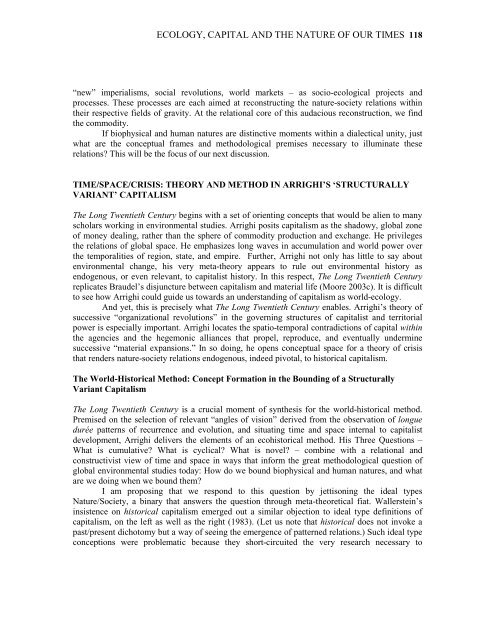Entire Volume 17 issue 1 - Journal of World-Systems Research ...
Entire Volume 17 issue 1 - Journal of World-Systems Research ...
Entire Volume 17 issue 1 - Journal of World-Systems Research ...
Create successful ePaper yourself
Turn your PDF publications into a flip-book with our unique Google optimized e-Paper software.
ECOLOGY, CAPITAL AND THE NATURE OF OUR TIMES 118<br />
“new” imperialisms, social revolutions, world markets – as socio-ecological projects and<br />
processes. These processes are each aimed at reconstructing the nature-society relations within<br />
their respective fields <strong>of</strong> gravity. At the relational core <strong>of</strong> this audacious reconstruction, we find<br />
the commodity.<br />
If biophysical and human natures are distinctive moments within a dialectical unity, just<br />
what are the conceptual frames and methodological premises necessary to illuminate these<br />
relations? This will be the focus <strong>of</strong> our next discussion.<br />
TIME/SPACE/CRISIS: THEORY AND METHOD IN ARRIGHI’S ‘STRUCTURALLY<br />
VARIANT’ CAPITALISM<br />
The Long Twentieth Century begins with a set <strong>of</strong> orienting concepts that would be alien to many<br />
scholars working in environmental studies. Arrighi posits capitalism as the shadowy, global zone<br />
<strong>of</strong> money dealing, rather than the sphere <strong>of</strong> commodity production and exchange. He privileges<br />
the relations <strong>of</strong> global space. He emphasizes long waves in accumulation and world power over<br />
the temporalities <strong>of</strong> region, state, and empire. Further, Arrighi not only has little to say about<br />
environmental change, his very meta-theory appears to rule out environmental history as<br />
endogenous, or even relevant, to capitalist history. In this respect, The Long Twentieth Century<br />
replicates Braudel’s disjuncture between capitalism and material life (Moore 2003c). It is difficult<br />
to see how Arrighi could guide us towards an understanding <strong>of</strong> capitalism as world-ecology.<br />
And yet, this is precisely what The Long Twentieth Century enables. Arrighi’s theory <strong>of</strong><br />
successive “organizational revolutions” in the governing structures <strong>of</strong> capitalist and territorial<br />
power is especially important. Arrighi locates the spatio-temporal contradictions <strong>of</strong> capital within<br />
the agencies and the hegemonic alliances that propel, reproduce, and eventually undermine<br />
successive “material expansions.” In so doing, he opens conceptual space for a theory <strong>of</strong> crisis<br />
that renders nature-society relations endogenous, indeed pivotal, to historical capitalism.<br />
The <strong>World</strong>-Historical Method: Concept Formation in the Bounding <strong>of</strong> a Structurally<br />
Variant Capitalism<br />
The Long Twentieth Century is a crucial moment <strong>of</strong> synthesis for the world-historical method.<br />
Premised on the selection <strong>of</strong> relevant “angles <strong>of</strong> vision” derived from the observation <strong>of</strong> longue<br />
durée patterns <strong>of</strong> recurrence and evolution, and situating time and space internal to capitalist<br />
development, Arrighi delivers the elements <strong>of</strong> an ecohistorical method. His Three Questions –<br />
What is cumulative? What is cyclical? What is novel? – combine with a relational and<br />
constructivist view <strong>of</strong> time and space in ways that inform the great methodological question <strong>of</strong><br />
global environmental studies today: How do we bound biophysical and human natures, and what<br />
are we doing when we bound them?<br />
I am proposing that we respond to this question by jettisoning the ideal types<br />
Nature/Society, a binary that answers the question through meta-theoretical fiat. Wallerstein’s<br />
insistence on historical capitalism emerged out a similar objection to ideal type definitions <strong>of</strong><br />
capitalism, on the left as well as the right (1983). (Let us note that historical does not invoke a<br />
past/present dichotomy but a way <strong>of</strong> seeing the emergence <strong>of</strong> patterned relations.) Such ideal type<br />
conceptions were problematic because they short-circuited the very research necessary to





